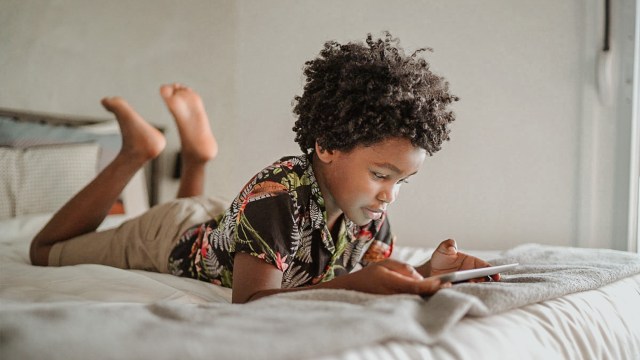Whether at school or home, spending lots of time online has become an inescapable part of most kids’ daily lives. According to a study by Common Sense Media, children ages 8 to 12 spend an average of 5 hours and 33 minutes per day on screens, which include computers, smartphones, tablets, and gaming consoles. Meanwhile, a study by Pew Research found that 98% of teens have access to a smartphone and the average teen spends 7 hours and 38 minutes per day on their phone.
While there are plenty of educational, social, and creative benefits to digital screen time, care must be taken to ensure that a child’s digital footprint and online activities are age-appropriate and commensurate with their level of maturity and understanding.
The key to developing healthy online practices is having open and frequent conversations about safety and using the internet responsibly—and initiating these conversations early. “Start talking about online safety with your kids at a young age because it gets harder when they are in their teens, and it becomes more difficult to get between them and their phones,” said Yaron Litwin, digital safety expert and Chief Marketing Officer at Canopy, an AI-powered smart filter that helps protect kids online.
Most experts and parents agree that children shouldn’t have unfettered internet access until at least age 10, but that’s often easier said than done, and there’s no one-size-fits-all approach. Despite the challenges of monitoring your kid’s myriad online activities, some behaviors should be strictly forbidden. For a list of internet safety tips for kids, here are 10 things they should never do online, based on their ages.
Internet Safety Tips for Kids Ages 5 to 8
Don’t have social media profiles: Apps like TikTok and Snapchat may be irresistible to young kids because of the fun social media trends like dance challenges and viral music clips they see older kids creating and participating in, but public social media profiles can open up young children to inappropriate contact, harassment or targeting. The expert consensus is for kids to wait until ages 14 or 15 to create public-facing social media accounts.
Don’t talk to strangers: This advice we often give our kids IRL applies doubly so online because of the dangers of catfishing, trolling, and spoofing. Children should never talk to strangers online, even if the stranger seems friendly. Let your child know in an age-appropriate manner that anyone online can pretend to be someone else, and that predators often target children because of their innocence and openness.
Don’t use the internet without limits or supervision: Screen time has increased exponentially in recent years, especially for young children. Kids need to experience a healthy balance between online and offline activities, and parents can help by establishing clear limits on screen time as well as supervising young children’s online activities.
Related: 10 Reasons Why You Need to Teach Internet Safety to Your Kids
Internet Safety Tips for Kids Ages 8 to 12

Don’t give or share any personal information: In an always-on, digitally connected world, privacy can be challenging to maintain. Children need to learn that personal information—whether it’s their own or family member’s personal information—needs to be held strictly confidential and not shared or given to anyone online. This includes full names, home addresses, phone numbers, school names or locations, passwords, etc. Personal information can be used by predators and criminals to track down children or to commit identity theft. Parents also may want to avoid posting identifiable images of their children online.
Don’t meet up with someone you met exclusively online: Whether it’s on gaming platforms like Roblox or Minecraft, or social messaging apps like WhatsApp, it’s not uncommon for children to develop friendships that are entirely virtual; however, even if your kid has been talking to someone online for a long time and they feel as if they know them well, it’s not safe for kids to meet up in person with online strangers on their own. There’s no way to know for sure who they really are or what their intentions might be.
Don’t cyberbully others: Cyberbullying is just as harmful as bullying in person; it can have a devastating impact on victims. Children should never bully others online, and they should report any cyberbullying they see to a trusted adult.
Related: What to Do When Your Kid Wants a Social Media Account
What to Teach Tweens and Teens About Using the Internet Responsibly
Don’t click links or open attachments from people you don’t know: Unwanted spam that arrives via e-mail or text can be annoying, but trojan horses sent via links or attachments from unknown senders can contain malware and other bugs designed to infect your child’s computer or mobile device and steal personal information or worse. When it comes to stuff that comes from an unknown sender, kids should simply delete it.
Don’t download pirated music, movies, or games: While it may be tempting for your child to download “free” pirated materials from the internet, doing so is illegal and can lead to serious consequences. Copyright holders can pursue legal action, and penalties often are severe. Teach your child how to use legitimate sources to download and purchase movies, music, and games.
Don’t post inappropriate content: Older kids may think posting inappropriate content online is no big deal, but they should be taught never to post anything they wouldn’t want their family, friends, classmates, or teachers (not to mention future employers) to see online. This can include photos, videos, or texts that are sexual in nature, violent, or hateful. It’s useful to remind your tween and teen that everything on the internet is forever.
Internet Safety Tips for Everyone
Don’t believe everything you see or read online: Just because it’s on the internet doesn’t mean it’s true or even real. In our current time, when the digital ecosystem is rife with misinformation, children need to be taught to think critically about the information and materials they find online, and parents can help promote digital media literacy by helping our kids understand what are trusted and reliable sources of information and what’s not.
Related: 10 Cyberbullying Tactics Parents Might Not Know About











